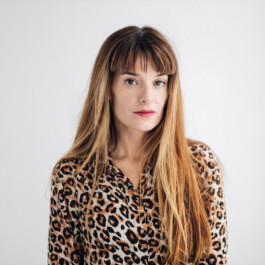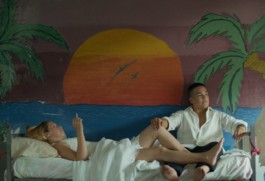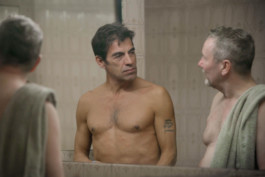
Lola Arias (2024), photo by Cherie Birkner
Lola Arias (Argentina) is a writer, theatre and film director. She is a multifaceted artist whose work brings together people from different backgrounds (war veterans, refugees, sex workers, etc.) in theatre, film, literature, music and visual art projects.
Arias’s productions blur the boundaries between reality and fiction. As Etchells writes in Re-enacting Life (2019) ”Sitting in the theatre, wandering a site-specific location or watching a film, we are inculcated into others’ narratives wound into their complexities, joys and disappointments. At the same time, we are also invited and at times confronted, in an extraordinary and acute way, to reflect on the contingencies and fragilities of our own stories, individual and collective, as well as on our shifting, unresolved relation to the precarious and dangerous machinery that is social and political history.”
Arias studied Literature at the Universidad de Buenos Aires and Dramaturgy at the Escuela de Artes Dramáticas (Buenos Aires) and participated in playwrights’ residencies at the Royal Court Theatre (London) and Casa de América (Madrid). In 2014 she completed the Film Laboratory workshop at the Universidad Di Tella (Buenos Aires).
Between 2001 and 2007, she wrote and directed six fictional pieces: The Squalid Family, Studies of Loving Memory, Poses for Sleeping, and the trilogy Love is a Sniper, Revolver Dream, and Striptease. Since 2007, she has worked in documentary theatre, creating over twelve plays in collaboration with people who have lived through different events and historical experiences.
My Life After (CTBA, Buenos Aires, 2009) is based on the life stories of six performers who re-enacted their parents’ lives during the dictatorship in Argentina. Familienbande (Münchner Kammerspiele, Munich, 2009) deals with role models in a contemporary family with three parents. That Enemy Within (HAU, Berlin, 2010) is a project about identity made in collaboration with two identical twins. The Year I was Born (Teatro a Mil, Santiago, 2012) is based on the stories of people born during Pinochet’s dictatorship. Melancholy and Demonstrations (Wiener Festwochen, Vienna, 2012) is a play about Arias’s mother’s depression. The Art of Making Money (Stadttheater Bremen, 2013) is a play about fiction and compassion performed by beggars, prostitutes, and street musicians from the city of Bremen. And The Art of Arriving (Stadttheater Bremen, 2015) is a kind of tutorial that reflects on how to start a new life in another country, using the example of Bulgarian kids living in Germany.
Minefield (Royal Court Theatre, London, 2016), brings together British and Argentinian veterans of the Falkland/Malvinas war to share their experience of the conflict and life since. Atlas des Kommunismus (Maxim-Gorki Theater, Berlin, 2016) gathers the stories of women between the ages of 8 and 84 with backgrounds in East Germany. What They Want to Hear (Münchner Kammerspiele, Munich, 2018), is the reconstruction of the real case of a Syrian archaeologist trapped in German bureaucracy for years with no legal status. Futureland (Maxim-Gorki Theater, Berlin, 2019) is a science-fiction documentary piece with unaccompanied minors, teenagers who escaped from war, poverty, violence and migrated to Germany on their own. Ich bin nicht tot (Staatstheater Hannover and Theaterformen Festival, 2021) is a piece in which a group of people over sixty-five and their caregivers reflect on their secondary role in today's pandemic society. Mother Tongue is an encyclopaedia on reproduction in the twenty-first century, created from different stories intersected by motherhood, performed by various communities in Bologna, Madrid and Berlin. In Happy Nights (Theater Bremen, 2023) the audience is invited to enter immersive rooms, to meet dancers and sex workers and reflect with them on our relationships with sex, money, lust, and pain. Arias’ latest work, Los Días Afuera / The Days Out There (2024), a continuation of the work started with the film REAS, features former Argentine inmates, both cis women and trans people, who tell the story of their lives once outside prison.
Her first feature film Theatre of War (2018) was selected for the 68th Forum of the Berlinale Film Festival and received several prizes including the CICAE Art Cinema Award, the Prize of the Ecumenical Jury, Best Director Award at the 20th BAFICI Festival, the Movistar+ Prize for Best Documentary Film at Documenta Madrid and the Silver Condor Award for Best Adapted Script. Arias also created the short film Far Away from Russia (2021), commissioned by Manchester International Festival.
Her second feature film, Reas (2024), premiered at the 74th Forum of the Berlinale Film Festival and got the Best Documentary Award at the Luxemburg Film Festival. The film brings together stories of cis women and trans people who have been in prison, in a reinvention of the musical genre in documentary format, mixing the former inmates’ personal stories and experiences with music and choreography.
In the visual arts and curating field, she developed My Documents, a lecture-performance cycle where artists from different backgrounds present personal research. She also conceived the durational performance Audition for a Demonstration, a spontaneous audition for a re-enactment of a demonstration that happened in the past. She created the exhibition Stunt Double (Buenos Aires, 2016), in which four different installations rebuilt the last 40 years of Argentinian social and political history through reenactments, interviews and protest songs; and Ways of walking with a book in your hand (Buenos Aires, 2017), a site-specific project for readers in libraries and public spaces.
With Ulises Conti she released the albums Love is a Sniper (2007) and Those Who do not Sleep (2011), and with Stefan Kaegi she developed the projects Chácara Paraíso (2007), Airport Kids (2008) and Ciudades Paralelas (2010), a festival of urban interventions in Berlin, Buenos Aires, Warsaw, Zurich and other cities.
She has published poetry, fiction and plays: Love is a Sniper (2007, Entropía), The Postnuclear Ones (2011, Emecé), My Life After and Other Plays (2016, Penguin Random House) and a bilingual edition of her play Minefield (2017, Oberon Books). In 2019, Performance Research Studies published Re-enacting Life, a book that gathers together articles, plays and documents from her career.
Lola Arias has received numerous awards (Konex Award 2014, Preis der Autoren 2018). In 2024, she won the prestigious International Ibsen Award. The award ceremony took place on October 13th 2024, at the National Theatret in Oslo, Norway. Her films have been shown in international film festivals such as Berlinale, San Sebastian and BFI, and her theatre work has been performed at festivals such as Festival d’Avignon; Lift Festival, London; Under the Radar, NY; Theater Spektakel, Zurich; Wiener Festwochen; Festival Theaterformen; Spielart Festival, Munich, and in venues including Théâtre de la Ville, Paris; Redcat, LA, Walker Art Centre, Minneapolis; Parque de la Memoria, Buenos Aires; Museum of Contemporary Art Chicago, and Moma Musem, NY.
CAREER AWARDS
From the Committee Statement:
«By bringing those whose stories are being told into the very process of shaping and performing the work, she has asked profound questions about ownership, agency, ethics and artmaking. Arias’ work — encompassing short stories, tanztheater, films, installations, compositions, and poetry as well as theatre — has been both profoundly grounded in the context in which it is made and resolutely transnational in its focus and impact.»
READ THE FULL STATEMENT
From the acceptance speech:
«Now you can see that behind my name there are many people. Because, in the end, theater is a somewhat convoluted way of expanding the family and spending time with people imagining things in a room without windows.»
READ THE FULL ACCEPTANCE SPEECH
EVENTS FOR THE INTERNATIONAL IBSEN AWARD CEREMONY
REAS
10 October 2024
MIRAGE Film Festival, Oslo, Norway
LOS DÍAS AFUERA / THE DAYS OUT THERE
12 October 2024
two shows
National Theatret, Hovedscenen, Oslo, Norway
PANEL TALK
12 October 2024
Publikumsfoajéen, Johanne Dybwads plass 1, Oslo, Norway
THE INTERNATIONAL IBSEN AWARD CEREMONY
13 October 2024
National Theatret, Hovedscenen, Oslo, Norway


20th BAFICI Festival, Buenos Aires
Best Director Award 2019
Preis der Autoren 2018
for the Project Theatre of War (film and theatre play)
PROYECTS AWARDS
Thessaloniki International Documentary Festival
Film Forward Competition andThe Golden Alexander, Mermaid Award 2024
Luxembourg City Film Festival
Best Documentary 2024
Cinélatino - Rencontres de Toulouse
Audience Award 2024
Mix Festival Internazionale di Cinema LGBTQ+ e Cultura Queer di Milano
Best Documentary 2024
Festival de Films de Femmes
Anna Politkovskaya Jury Award for the Best Documentary
Audience Award for the Best Documentary 2024
Lima Film Festival
Special Mention for Best Documentary 2024
Gaze LGBTQIA Film Festival
Jury Award 2024
San Sebastián Film Festival
Premio Sebastiane 2024
NewFest New York LGBTQ+ Film Festival
Grand Jury Award and Audience Award for Best Documentary Feature 2024
Weiterstadt Queer Film Festival
Queer Don Quijote Award 2024
LesGaiCineMad
Special Jury Mention for the film’s cast and Audience Award for Best Queer Film 2024
Festival Écrans Mixtes
Honorary Award Philippe Vallois 2024
Roffa Mon Amour Film Festival
New Amour Award 2025
2018 > 2019
Argentinean Film Critics Association Awards
Silver Condot award for Best screenplay, adapted 2019
Documenta Madrid
Movistar+ Prize for Best Documentary Film 2019
in the frame of Berlin International Film Festival
C.I.C.A.E Award 2018
Prize of the Ecumenical Jury 2018

